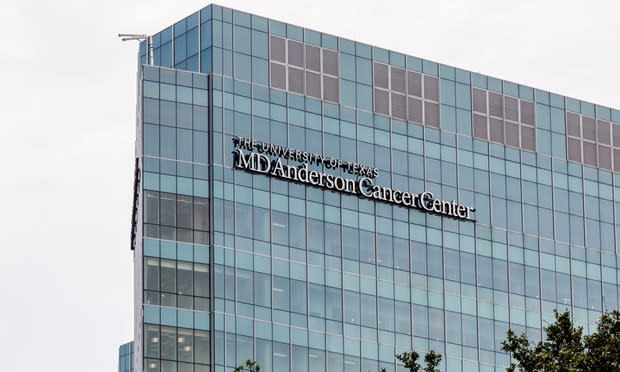Fearing Chinese Spies, US University General Counsel Scrutinize Researchers

The University of Texas MD Anderson Cancer Center in Houston. Photo: Shutterstock
As the University of Texas MD Anderson Cancer Center moved to terminate three research professors, general counsel and chief compliance officers at dozens of research universities around the country were struggling with how to handle federally mandated investigations of their scientists.
The National Institutes of Health, the nation’s largest funder of biomedical research, recently demanded that MD Anderson and 54 other institutions investigate scientists linked to possible foreign espionage. The U.S. government has warned that foreign governments, especially China, are recruiting students and visiting scholars to copy intellectual property data from confidential grant applications, enabling scientists to set up “shadow laboratories” in the foreign countries.
Since August 2018, MD Anderson received individual letters from NIH asking for investigations into and appropriate action on five Asian researchers suspected of conflicts of interest or unreported foreign income. MD Anderson and its general counsel, Steven Haydon, did not immediately return a message seeking comment.
The Houston Chronicle and Science magazine jointly broke the story April 19 that MD Anderson started termination proceedings against three of the professors, cleared one and continues investigating the fifth. Two of the three ousted professors resigned before the proceedings.
NIH would not share the contents of those letters Tuesday, but it confirmed that dozens of other facilities also received such letters. MD Anderson is the first known to react to the NIH demands.
In a statement to Corporate Counsel, NIH said, “When NIH notified MD Anderson of concerns with specific individuals within its institution, the university took immediate steps to remediate the problem. These incidents are not unique to MD Anderson and we remind universities to look closely at their organizations to mitigate unscrupulous practices by foreign entities that aim to capitalize on the collaborative nature of the U.S. biomedical enterprise.”
The statement concluded, “NIH commends MD Anderson for their actions. We encourage other NIH grantee institutions to learn from the MD Anderson experience.”
Beyond that, NIH said it would not “discuss individual or pending reviews, and does not comment on specific cases.”
The in-house lawyers in the institutions receiving letters are walking a tightrope. If their investigations are too intrusive and disruptive, talented scientists will leave, as has happened at MD Anderson. But if they are not thorough enough, the NIH could pull funding.
The lawyers also must lead investigations into primarily Chinese scientists while facing public criticism from prominent Chinese Americans, as MD Anderson has, of racial profiling.
According to the Houston Chronicle article, MD Anderson’s involvement in the investigations began in November 2015, when Lessley Stoltenberg, its chief information security officer, received a letter from the Houston FBI office requesting assistance on a national security investigation.
Then in July 2017, CLO Haydon received a letter and later a subpoena from the FBI about another investigation into possible theft of MD Anderson research and proprietary information. Haydon received another letter in November 2017.
The first NIH investigation demand about a specific researcher came in August 2018, the article said. It said MD Anderson’s chief compliance and ethics officer, Max Weber, did an internal investigation on that case and the four subsequent ones.
Around the same time NIH director Francis Collins outlined concerns about threats to the integrity of U.S. biomedical research in an August 2018 statement. Three key areas of concern were: 1. failure by some researchers at NIH-funded institutions to disclose substantial contributions of resources from other organizations, including foreign governments; 2. diversion of intellectual property in grant applications or produced by NIH-supported biomedical research to other entities, including other countries; and 3. sharing of confidential information by peer reviewers with others, including in some instances with foreign entities, or otherwise attempting to influence funding decisions.
Collins said, “The challenge is to find ways to build and continue important and successful relationships with foreign scientists around the world while simultaneously protecting the nation’s biomedical innovations and intellectual property.”
NIH said a working group of the advisory committee to the director has made recommendations on best approaches to deal with this issue. The agency said it also is working with other federal agencies, scientific professional societies and grantee institutions to address this challenge.
The issue of foreign espionage in U.S. research institutions was at the center of a 2017 book by ProPublica journalist Daniel Golden. The book, "Spy Schools: How the CIA, FBI, and Foreign Intelligence Secretly Exploit American Universities," told how a Duke University graduate student allegedly took Duke’s research on metamaterials—a type of super manmade material—to create a multibillion-dollar Chinese company.



